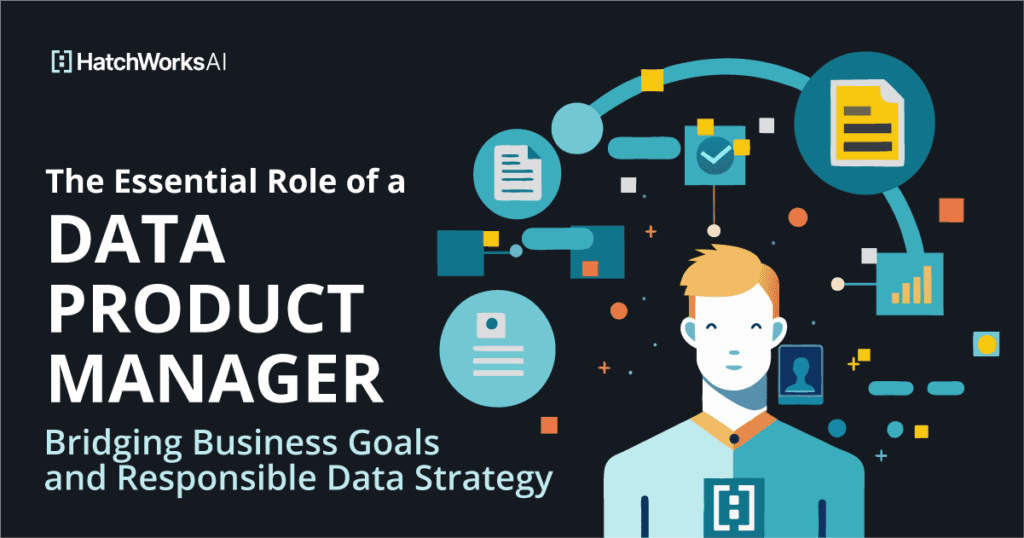Data Product Managers are at the forefront of the modern, data-driven business landscape. They are vital in transforming raw data into actionable insights and products that drive business growth.
Their most crucial task, however, is ensuring that data strategies are aligned with responsible and ethical use. This involves balancing business goals with privacy, compliance, and transparency and ensuring that the data is used to respect the rights and interests of the individuals it pertains to.

👋Hi, I’m Jonathan Barrios, Business Analyst and Technical Product Owner at HatchWorks AI, and I’m thrilled to share my insights on data governance. With broad experience spanning project management, business analysis, and agile leadership, I’ve seen firsthand how critical it is for organizations to protect and properly manage their data.
In this article, we explore this exciting and dynamic role’s key responsibilities, skills, challenges, and future trends.
What is Data Product Management?
Definition and Importance
Data product management is the ongoing process of developing and maintaining data products that meet organizational objectives and deliver clear value to data consumers.
By bridging the gap between technical teams and business stakeholders, it leverages data to drive strategic decisions and catalyze growth.
Effective data product management ensures that these products remain high-quality, accessible, and aligned with well-defined business needs, enabling organizations to harness the full potential of their data while fostering collaboration and innovation.
Key Responsibilities of a Data Product Manager
Identifying Market Needs and Defining Product Vision
At its core, a Data Product Manager’s role connects business objectives to actionable data insights. This begins by deeply understanding the organization’s goals—whether it’s enhancing customer retention, improving operational efficiency, or launching new data-driven products.
Data Product Managers then translate these goals into data products and features that can directly support these objectives. These data products could range from customer segmentation models to predictive maintenance algorithms.

For instance, if the goal is to increase customer loyalty, a Data Product Manager might leverage customer data to develop personalized recommendations based on customer preferences and past interactions.
Building a Data-Driven Roadmap
A Data Product Manager creates a comprehensive roadmap to achieve business objectives. This roadmap includes setting clear priorities for data initiatives, determining timelines, and identifying needed resources.
The roadmap serves as a guide for all teams involved, helping to keep everyone aligned on the end goals and ensuring the data product’s success.
Data Product Managers, however, understand that business needs evolve, and they maintain flexibility and adaptability by periodically revisiting and adjusting this roadmap, providing reassurance in their ability to handle growing business needs.

Accelerate Data-Driven Results with a Clear AI Roadmap
Unsure how to turn your organization’s data into transformative AI-driven products?
Our AI Strategy & Roadmap service pinpoints your highest-ROI use cases, trains your team for long-term success, and delivers an actionable plan.
Don’t just theorize about AI—partner with experts who can actually build it.
Collaborating With Cross-Functional Teams
Data Product Managers work closely with multiple teams, including data scientists, engineers, designers, and business stakeholders. They serve as a bridge between technical and non-technical teams, ensuring each team understands the product’s purpose and objectives.

This collaboration is essential for aligning everyone on a shared vision and ensuring the product meets both technical requirements and business expectations. Effective Data Product Managers are skilled communicators who can translate complex data concepts into language that resonates with each team, underscoring the importance of their communication skills.
Essential Skills for Data Product Managers
Essential skills for data product managers span both technical expertise and analytical communication capabilities.
Technical Skills
On the technical side, a strong understanding of data architecture, data pipelines, and analytics tools is vital. Familiarity with data engineering concepts—such as data warehousing and ETL processes—ensures that data products can scale effectively and remain reliable.
Equally important is a solid grasp of data management best practices, including data quality monitoring and governance.
Data Analysis and Communication Skills
On the analytical and communication front, the ability to interpret complex data sets and extract actionable insights is paramount. Data product managers must also collaborate effectively with cross-functional teams, translating technical information into clear, concise language for non-technical stakeholders.

By honing these skills, they can drive successful data initiatives that align with strategic business objectives.
Communication and Leadership Skills
Effective communication is crucial for Data Product Managers, who often need to explain complex data insights to non-technical stakeholders. Leadership skills are equally important, as Data Product Managers guide diverse teams toward a shared goal. They must inspire collaboration, motivate teams, and foster a culture of open communication and trust.
Data Product Management in Practice
In practice, successful data product management hinges on maintaining a careful balance between innovation and data quality.
Balancing Innovation with Data Quality
By prioritizing clean, trustworthy data as the cornerstone of new initiatives, organizations not only reduce the risk of errors and compliance breaches but also create an environment in which experimentation can thrive.
Striking this balance allows teams to push boundaries while upholding the highest standards of data integrity and adherence to regulations, ensuring that innovative ideas progress without compromising long-term success.
Aligning Cross-Functional Teams
At the same time, it’s equally important to foster alignment across diverse teams by promoting open communication and collaboration around product goals.
By prioritizing clean, trustworthy data while uniting cross-functional stakeholders, organizations can use data-driven insights to inform product decisions and ultimately deliver solutions that meet both user needs and strategic business objectives.

Ready Your Data for AI Success
Data Product Managers depend on reliable, well-governed data to power AI solutions.
With our Data Foundations & Analytics service, HatchWorks AI modernizes your data architecture, ensuring clean, secure, and analytics-ready data.
Stop letting poor data quality slow you down—build a solid foundation that supports all your AI and analytics initiatives.
Developing a Responsible Data Strategy
What Makes a Data Strategy “Responsible”?
A responsible data strategy prioritizes ethical considerations, user privacy, and regulatory compliance. It collects and uses data to respect users’ rights and protect sensitive information. A responsible data strategy also involves transparency—communicating to users how their data is collected and used.
Privacy, Compliance, and Ethical Data Usage
Data Product Managers ensure that data products adhere to privacy laws like GDPR and CCPA. They work closely with compliance officers to implement data-handling practices, prioritizing user consent and securing data usage. This compliance is essential for maintaining user trust and avoiding potential legal issues.
Ensuring Transparency and Trust with Data
Transparency is a cornerstone of responsible data strategy. Data Product Managers must ensure that users understand how their data is used and can control their preferences. By building transparent policies and clear communication, Data Product Managers help foster trust and reinforce the company’s commitment to ethical data use.
Future Trends in Data Product Management
As data becomes the backbone of decision-making, the role of Data Product Managers is evolving. Let’s explore the key trends shaping this exciting field and how they’re transforming industries.
The Rise of AI-Driven Products That Leverage Data
AI is revolutionizing industries with smarter, more personalized solutions. From recommendation engines to predictive analytics, AI enables businesses to unlock new efficiencies and user experiences. Data Product Managers play a pivotal role in integrating AI responsibly, ensuring fairness, accuracy, and trust.
For example, managing an AI-powered recommendation system means not only optimizing for user engagement but also ensuring diverse and unbiased content suggestions. Collaboration with data scientists and engineers is critical to maintaining ethical AI applications while meeting business goals.
Increased Focus on Data Ethics and Governance
Ethical data use has become a priority, replacing outdated approaches of rapid innovation without foresight. With regulations like GDPR and CCPA, Data Product Managers now champion transparency and user trust.
Their responsibilities include defining clear data use policies, ensuring compliance with evolving laws, and communicating openly with users. By embedding ethical practices, they protect their organizations from risks while building loyalty and confidence in their products.
Expansion of Data Product Roles Across Industries
Data Product Management roles are spreading beyond tech into industries like healthcare, finance, and manufacturing. As more organizations realize the value of data-driven insights, the demand for skilled professionals grows.
In healthcare, for example, Data Product Managers oversee predictive tools that identify high-risk patients early, improving outcomes. In finance, they enable real-time fraud detection through advanced analytics. Across sectors, their blend of industry expertise and data acumen drives innovation and results.
Frequently Asked Questions
What does a Data Product Manager actually do?
A Data Product Manager’s job revolves around creating and managing data-driven products that deliver valuable insights to both internal data consumers and external customers. Unlike traditional product managers, who focus on general product features and customer satisfaction, and how is this role different from a traditional Product Manager?
How is this role different from a traditional Product Manager?
Data Product Managers need strong data literacy and data governance expertise. They align a company’s data assets with business goals, collaborating with data engineers, data scientists, and other data team members to analyze data and build data solutions.
Their role also involves defining the product strategy, overseeing data collection and management, and ensuring data pipelines and data infrastructure support broader organizational vision.
How do Data Product Managers collaborate with data scientists, data engineers, and other data team members to develop data products?
Collaboration is crucial in large data initiatives, and a good Data Product Manager acts as the central hub. They partner with data scientists to shape machine learning models using relevant data science techniques, guide data engineers in building robust data pipelines, and align product managers across teams on key metrics.
A strong data product manager role involves breaking down technical silos, making sure data management practices are in place, and enabling data professionals to create valuable insights for data users.
By coordinating cross functional development, they help turn raw data into data driven products that address user needs and drive customer satisfaction.
What does a “responsible data strategy” mean?
A responsible data strategy ensures that a company’s data is collected, stored, and used ethically, with privacy, compliance, and transparency at the forefront.
Why do Data Product Managers need to prioritize it?
Data Product Managers are responsible for designing data products that respect user rights, comply with regulations like GDPR or CCPA, and foster trust among internal data consumers and external customers.
This means building data governance frameworks, assessing data usage for potential risks, and involving stakeholders in open discussions on user needs and consent.
Ultimately, responsible data strategies help maintain customer satisfaction, protect a company’s reputation, and ensure data solutions align with both market research and ethical standards.
How do Data Product Managers build a strong product roadmap that aligns with business goals and data-driven insights?
A well-defined product roadmap starts with clear product strategy and market assessments. Data Product Managers identify trends by analyzing large scale data, gathering insights from data analytics and data visualization tools, then prioritizing key initiatives based on customer needs and broader organizational vision.
They collaborate with product teams to integrate user feedback, data personas, and search engine optimization considerations when planning new features.
By setting realistic milestones and orchestrating the right mix of internal data capabilities, Data Product Managers ensure data platforms and data infrastructure stay aligned with changing business needs, while keeping the entire product team focused on delivering high-impact data driven products.
What skills and background do I need if I want to become a Data Product Manager?
Aspiring Data Product Managers often come from product management, data analysis, or software engineering backgrounds.
Strong data literacy, knowledge of data pipelines, and familiarity with data science techniques are critical.
Experience collaborating with cross functional teams—like data analysts, data engineers, and software engineers—is equally important for large scale data projects.
Leadership, communication, and data governance know-how also set a good Data Product Manager apart.
What is the average salary for this role?
Regarding salary, market research indicates that average pay can vary widely based on location and experience, but many data product managers earn competitive compensation, often higher than traditional product managers due to increasing demand for data-driven expertise.Get Your Data AI Ready
Partner with HatchWorks AI to assess your AI Data Readiness and Governance to create a clear path to AI success.



